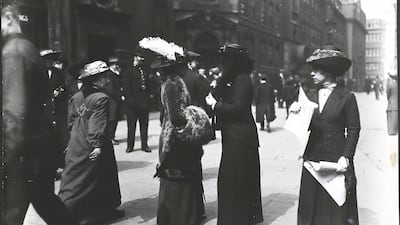The story of Emily Wilding Davison being killed by a horse in the cause of women’s right to vote was one of the most common tales I heard as a child about the protests of the Suffragettes. On June 4, 1913, she attended the Epsom Derby and stepped out in front of the King’s horse and was run over by the horse travelling at speed. Whether she intended it or not, nobody knows. But her death is marked in the folklore recounted to me as a sacrifice in the cause of righteousness.
But the Suffragettes weren’t the hallowed and universally accepted cause a hundred years ago that they are now. The right that society takes for granted, that women should vote, was deeply contentious, and Suffragettes were widely and mercilessly criticised. They were mocked as unfeminine and ugly – ironic given that those making these attacks thought pinning a woman’s worth to her looks and then belittling those looks were the most insulting and demeaning things they could do. When, of course, the entire premise of the women’s rights movements then and now is that women are not simply there to be eye candy or to take care of the children. The other mockery of the Suffragettes was that it would lead to the catastrophe of men needing to make their own dinners and look after the children, and how insulting and demeaning that would be to men. Which man would stand for that?
Women’s right to vote was the societal issue of that moment. And in that moment, the protests of women were vilified. A century on, they are now celebrated. It is a pattern we see repeated: everyone wants to claim they supported a protester with the benefit of hindsight. But when it comes to protests today, the willingness is much thinner in real life. And if the protesters are (young) women, then there is even greater irritation.

Climate activism is one example – it’s the big societal issue of our time. But the climate movement is often vilified for causing disruption. This is, in part, because some do cross the line into criminal damage and even militancy, impacting the wider movement including figures considered more mainstream.
Just think about the bizarre obsession Donald Trump had with Greta Thunberg. Or the unprompted trolling by former British kickboxer Andrew Tate of Ms Thunberg. How Malala Yousafzai upset people just by asking for an education, so much so that she was painted as an “agent” for “western” brainwashing. Jacinda Ardern’s premiership and recent resignation riled people. Who was she to decide to resign on her own terms? Her attempts to show kindness in leadership were derided as a “cult” of “Saint Jacinda”.
The stories of women’s suffrage are more acceptable for popular consumption today, yet we continue as societies to be agitated by female protesters. Now we have a new element to consider. What about those from minority ethnic groups, those not considered the “norm”, or those no matter how close they are to the top of the hierarchy are still considered outsiders: for them there is a double whammy of exclusion from the historical narrative.
We see this clearly in the case of Princess Sophia Duleep Singh. A central character in the Suffragette movement, she was also the co-founder of the Women’s Tax Resistance Union, an organisation that set about to deliver on the principle of “no vote, no tax”. Her story has until recently been almost entirely omitted from the narrative of the movement for women to vote. She was the daughter of the last ruler of the Sikh Empire in Punjab, India. The ruler was deposed at the age of 10 by the British when the East India company took over Punjab. Princess Sophia was born in Britain, and brought up as an aristocrat, with Queen Victoria being her godmother. She came to realise that she was at the heart of the British Empire, the very establishment that had led to her father’s exile. It was on a trip to India, where she met the country’s freedom fighters, that she became a revolutionary. When she returned to the UK, she embarked on her women’s rights’ activism.

Last month, the charitable organisation English Heritage announced that she was to be awarded one of its prestigious “blue plaques”. Emily Wilding Davison is also being awarded a blue plaque. Their accolades after a century should make us think about which causes that people are upset about now will be seen as essential to society in the future.
Today, there are many women who are climate activists, advocating for better parental rights, for peace rather than war, for different ways to address child care, elder care, the workplace, to do leadership and politics differently, and so much more. We need to learn the lessons from history that instead of dealing with women’s protests in the here and now as grating, that perhaps they are ahead of the curve, and are advocating for change that all of us desperately need.
But we need to tackle head-on the particular antagonism directed at women who are advocating for change. Particularly when they are young. Particularly when they are from less representative “outsider” categories. But most especially when it’s for the benefit of all of us.


